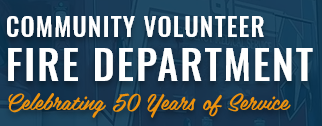We offer a 'Stop the Bleed' class where attendees learn the basics of bleeding control. Stop the Bleed is a national awareness campaign and call-to-action, encouraging bystanders to become trained, equipped, and empowered to help in a bleeding emergency before professional help arrives.

Interested in learning more about how to help in an emergency? We offer a 'Stop the Bleed' class where attendees learn the basics of bleeding control.
Stop the Bleed is a national awareness campaign and call-to-action, encouraging bystanders to become trained, equipped, and empowered to help in a bleeding emergency before professional help arrives.
Comprised of approximately 300 dedicated men and women, the Community Volunteer Fire Department is an all-hazard, full-service agency that responds to over 12,000 calls annually.
We proudly provide fire protection, emergency medical service, technical rescue, hazardous materials response, and a variety of other services to the public. As a combination department.
Our staff consists of both paid and volunteer members who fully staff our stations 24 hours a day. Formed in 1971, the Community Protection Agency acts as the department's board of directors. Additionally, CVFD's services
© 2025 coursetakers.com All Rights Reserved. Terms and Conditions of use | Privacy Policy